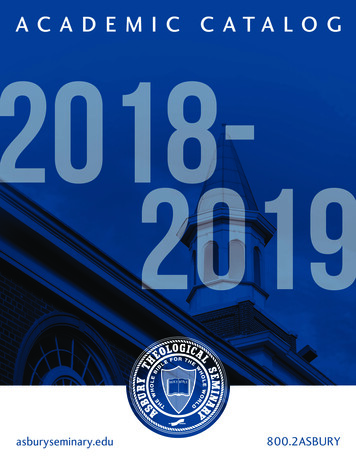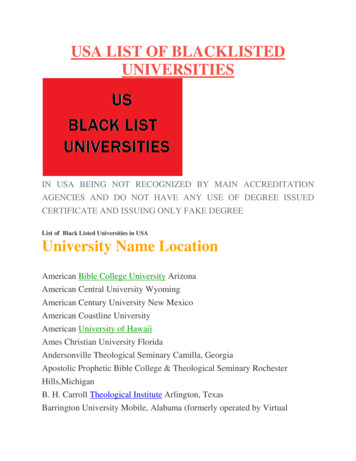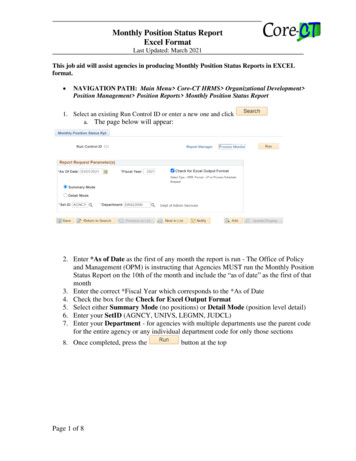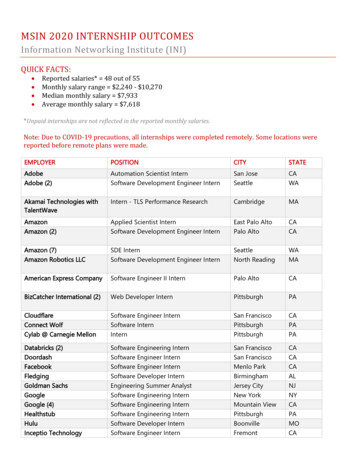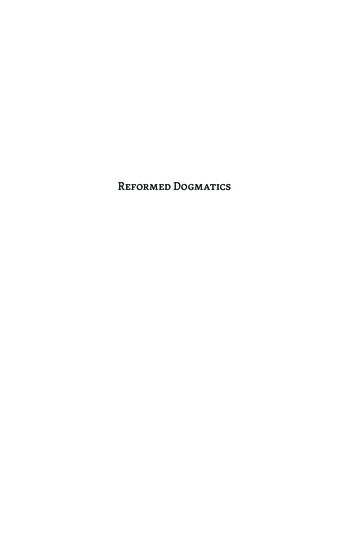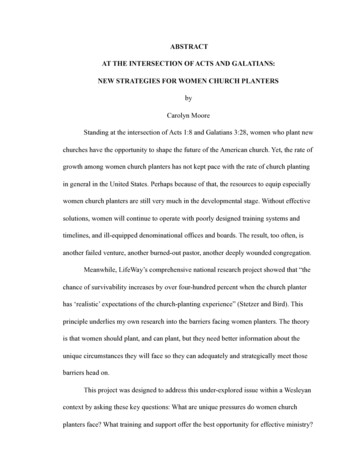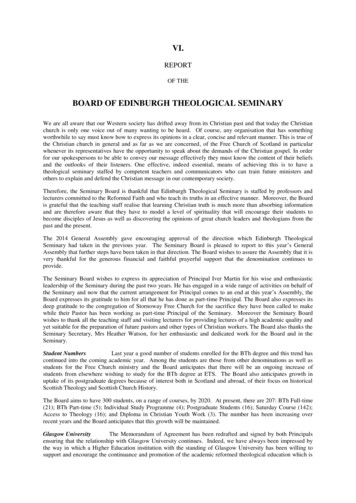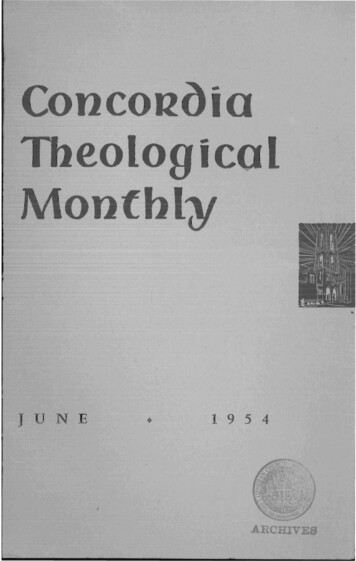
Transcription
Concoll i(JTheologicalMonthlyJUNE1954VRCHIVES
HECI:.IVEUJUNIVOL.xxvJUNE,19541954No.6Did Luther TeachThat Christ Committed Adultery?ByARTHUR 0.RL PIEPKORNI1os every pastor discovers, Roman Catholic ignorance - clericalhardly less than lay - of Lutheran and Luther's theology is. often abysmal.Something of a new nadir, however, was achieved by the Rev.Richard Ginder in the Roman Catholic weekly, Our Sunday Visitor}Vol. XLII, No. 44, February 28, 1954, page 12, when he wrote:"Did Martin Luther believe that Jesus was God?"In his 'Table Talk,' Weimar edition, ii, 107, one reads thefollowing hair-raising blasphemy: 'Christ committed adultery firstof all with the woman at the well about whom St. John tells us.Was not everybody about Him saying: "Whatever has He beendoing with her?" Secondly, with Mary Magdalen, and thirdly withthe woman taken in adultery whom He dismissed so lightly. Thuseven Christ, who was so righteous, must have been guilty of fornication before He died.' "Even the most casual reading around in the Weimar editionwould have furnished abundant explicit evidence for a positiveanswer to the Rev. Mr. Ginder's leading question. Hence charitycompels us to assume that, in his desperate determination to findsomething with which to discredit blessed Martin Luther, theRev. Mr. Ginder reached for a volume of the Weimar edition atrandom, chanced to take down the second volume of the Tischreden,and opened it by accident at page 107.Those who find such an assumption too unlikely may conjecturethat the source of the Rev. Mr. Ginder's quotation - although hedoes not say so - is a passionately partisan pamphlet published
418CHRIST COMMITTED ADULTERY?in England in 1945 under the title Martin Luther: Hitler's SpiritualAncestor (London: Hutchinson and Co. [1945}). Dedicated toLord Vansittart of Denham, the pamphlet is No.3 of the "Win thePeace" series put out by the identically named movement thatLord Vansittart headed. The author of the pamphlet was a Berlineducated refugee teacher of German at Rugby and Stowe. Onpage 29 he includes a translation of the same quotation that theRev. Mr. Ginder cites. Astonishingly Mr. Wiener's translation andthe Rev. Mr. Ginder's translation are in word-for-word agreement!(We may note in passing that it was Mr. Wiener's scurrilouspasquinade that drew the attention of the English Roman Catholiclay convert Arnold Moore Lunn to this passage from the Tischreden. Mr. Lunn referred to it on page 53 of The Revolt AgainstReason [London: Eyre and Spottiswoode, 1950J as "an obsceneblasphemy . the like of which it would be difficult to parallelin the pamphlets of the atheist underworld," and relegated themacaronic German-and-Latin original of "the inexplicable blasphemy" - with a partial English translation - to an appendix[page 233J because it was "too terrible to quote" in the text.Mr. Lunn is a brilliant essayist, and at least he took the trouble tolook up the original, but his information about Luther andLuther research is partial, synthetic, and largely secondhand.)But what about the "hair-raising blasphemy" that the Rev. Mr.Ginder cites?Here is how it appears in the Weimar edition-in full, complete with the pertinent footnotes:"1472. (Schlag. 239; Clm. 943, 175) Christus miulter. Christusist am ersten ebrecher worden Joh.4. bei dem brunn cum muliere,quia illi dicebant: Nemo 17 significat/8 quid facit cum ea? Itemcum Magdalena, item cum adultera loan. 8., die er so leicht davonlies. Also mus der from Christus auch am ersten ein ebrecherwerden, ehe er starb."17) So ist wohl zu lesen und nicht mit Preger: Nro. 18) Textundeutlich: Stat oder Scat, oder ist scit zu lesen?" 1In literal translation:"1472. (Schlag. 239; Clm. 943, 175) Christ an adulterer.Christ first became an adulterer St. John 4 at the well with thewoman, because they said: Nobody 17 indicates,18 what is He doing
CHRIST COMMITTED ADULTERY?419with her? Again, with Magdalen; again, with the adulteressSt. John 8, whom He dismissed so lightly. Thus the righteousChrist must first become also an adulterer before He died."17) This is the probable reading rather than Preger's: Nro.18) Text unclear: Stat or Scat, or should the reading be scit?"In 1888, Wilhelm Preger, the first person to publish this fragment, had reproduced the item thus:"239. Christus ist am ersten ein ebrecher worden Jo.4 bel dembrunn cum muliere, quia i11i dicebant .1 quid facit cum ea?item cum Magdalena, item cum adultera Joan. 8, die er so leichtdavon lies. Also mus der from Christus auch am ersten ein ebrecherwerden, ehe er starb."1) Die Warte nach dicebant: ruG stat sind undeutlich. Vgl.Joh. 4, 27: Nemo tamen dixit: Quid quaeris, aut quid loqueriscum ea?" [The words after dicebant: nro· stat are unclear. Compare St. John 4, 27: Yet nobody said, 'What are You seeking?',or, 'What are You talking about with her?''']2In both instances we have reproduced the item completely.There is no context. It is simply a briefly scribbled note of partof a conversation, none too intelligibly recorded or transmitted,with several important words illegible. But the Rev. Mr. Ginder'sconfident quotation indicates none of this.Whence do we have this snatch of table talk? It was originallyrecorded by a friend of blessed Martin Luther, the Rev. JohnSchlaginhaufen (or Schleinhauffen, or even, translated into Latinand Greek after the fashion of the times, Turbicida, Ochloplektes,Typtochlios) . We know little of him. The careful research ofG. Bossert indicates that he was probably born in the UpperPalatinate; that he probably matriculated at the University ofWittenberg in 1520; that he took: a Master's degree in philosophy;that he was a guest in the Luther household from November, 1531,until the fall of 1532; that then he became rector of the parishof Zahna and a year later rector of St. James' Church, Kothen;that Duke Wolfgang appointed him Superintendent of the churchesin the Duchy of Anhalt-Kothen; and that he died some time after1549.3 He seems to have recorded the particular item that we arediscussing between April 7 and May 1, 1532.4 The sole manuscriptcontaining this item is a quarto volume that found a final resting
42QCHRIST COMMITTED ADULTERY?place in the State Library at Munich, where it was cataloguedas Codex latinus 943. The page containing our item was copiedfrom an earlier copy - possibly Schlaginhaufen's original manuscript-between November 4, 1551, and some time in 1567.5The copyist may have been Schlaginhaufen's son-in-law, the Rev.John Oberndorfer of Ratisbon. 6Thus the "hair-raising blasphemy" turns out to be an inaccuratelytranslated version of a somewhat uncertain, uncontrolled and unverifiable quotation of an offhand remark of blessed Martin Luther,without a shred of context or any indication of the circumstancesthat evoked the words it purports to reproduce. Since the item wasdestined to remain in manuscript form for 356 years after it wasset down, it is quite probable that blessed Martin Luther himselfnever saw what Schlaginhaufen had written down.IIWe shall now let Luther himself answer the Rev. Mr. Ginder'squestion, "Did Martin Luther believe that Jesus was God?" andat the same time illuminate the statement that Schlaginhaufenattributes to the great Reformer, by quoting a few of the almostendless passages to which we might turn.At the outset we may note that for anyone familiar with Luther'sGerman the word from in the last sentence of the item would havesupplied the key, because fromm in Luther does not mean primarily"pious, religious, devout, God-fearing," as it does in modernGerman, but "morally righteous, holy."Turning to Luther himself, we begin with the Operationes inPsalmos of 1519-21:"We have said that Christ became sin for us, that, God deserting(Him], He became, although without guilt, in all things like thevery worst (novissimo) sinner, into whose conscience the very wrathof God penetrated and drove to desperation." 7"And this is that rich mystery of divine grace toward sinners,that by an astonishing interchange (admirabili commertio) our sinsare henceforth not our own, but they are Christ's, and the righteousness of Christ is not Christ's, but ours. For He emptiedHimself of it, that He might clothe us and fill us with it, and Hereplenished Himself with what was ours, so that He might empty
CHRIST CO.MMITTED ADULTERY?421us of it, in such a way that Christ's righteousness should henceforthbe ours not only objectively (obiective), as they say, but alsoformally (formaliter) , just as our sins are Christ's not only objectively but also formally. For in the same way that He mourns andis brought to confusion (confunditur) through our sins, in justthat way we rejoice and boast in His righteousness, but He Himselfmourns on their account also formally, as we see here." 8We turn next to the Deuteronomion Mosi cum annotationibttSof 1525:"If everyone who is hanged is accursed by God, as Moses teaches,then Christ also is the accursed of God. And if everybody who ishanged is a criminal (facinorosus), then Christ also is a criminal.Therefore the issue under discussion ought not to have been howChrist was without sin, but how Christ had sin. Again, the issueunder discussion ought not to have been how the Blessed Onecould not have been subjected to execution by hanging, but howHe was and could be subjected thereto."St. Paul solves the entire difficulty by this one word, in thathe says, 'He became a curse FOR US.' For us, I repeat, not forHimself. By this word he teaches once more that there are twoways in which a person can have sin and have God's curse descendon him. One way is on one's own account and because of one'sown sin, in which category all persons other [than Christ} belong;the other way is on account of others and because of somebodyelse's sin, in which category Christ belongs exclusively by Himself(solus et unus Christtls). In Psalm 68 [69:9J He says: 'The reproaches of them that reproach You have fallen on Me.' AndIsaiah 53: 'He Himself carried our sins.' And again: 'I havebeaten Him because of My people's sins' and 'The Lord willed tocrush Him on account of our sins'; and so forth. If thereforesomebody is hanged either on his own account or on account ofothers, the simple understanding of the statute remains, thateverybody who is hanged on account of sin is accursed by God.Therefore Christ in bearing our sin for us truly became accursed,in the literal meaning of the text. In exactly the same way He wascircumcised and subjected to the whole Law on our account, since,as far as He Himself was concerned, He was free from all Law.So He who knew no sin became sin, that we might be the right-
422CHRIST COMMITTED ADULTERY?eousness of God in Him, 2 Corinthians 6 [5 :21). So He who knewno curse became a curse, that 'we might in Him be the blessingof God." 9In a sermon of 1526, on "Das Euangelion am ersten Sontag derDreyualtickeit," we find this comment:"This is what St. Paul says to the Romans in the eighth chapter:'Out of sin He condemned sin: He has condemned sin with sin,put death to flight with death, conquered Law with Law. Howis that? Amid knaves He became a sinner on the cross with itssuperscription; as an archvillain (ertzboswicht) He suffers thejudgment and the penalty that a sinner ought to suffer. He wasinnocent, He never committed any sin, and the two were not overHim either in name or in deed (noch waren die zwey uber yhmder name mit der that). That means that He has become a sinner;that He loaded them on Himself, even though they were not Hisown; and that He annihilated sin through precisely those sinswhich He thus loaded on Himself and for which He let Himselfbe judged and condemned as a criminal. If one looks at Him onthe cross with eyes of reason, He is an evildoer, because He waspunished by God in such a way that the Jews said that He wasdeserted by God. There you have nothing but sin and the shape(gestalt) of the serpent; nevertheless He is innocent, just as thebronze serpent was innocent, yes, more than that, salutary. Eventhough He is altogether salutary and innocent, He is neverthelessthe equal of a sinner, so that only the shape is there, and throughHis sin He helps us out of our sin." 10From another sermon at the end of the same year, on "DieEpistel des Propheten Jesaia, so man in der Christmesse lieset,"we take this remark:"A means had to be found and devised whereby He couldsimultaneously be born of a woman and yet not be born of theflesh. That took place in this way: His mother had to be born 11not by the power and the inborn nature of the flesh, but supernaturally, by the particular power of the Holy Ghost. That is,His mother had to be a virgin and had to become pregnantwithout the co-operation of a male, as we confess in the Creed:'Who was conceived by the Holy Ghost,' and so forth. Thus it waspossible for Him to be a human being without sin and the Lord
CHRIST COMMITTED ADULTERY?423of sin, and sin could not have Him under itself from the firstmoment of His humanity. For it was also fitting that God's Sonbe born in this way, because it could not be that God's Son wereunder sin; otherwise God Himself would have become a sinnerand would have needed a Redeemer, just as we do. Who, then,could have helped us?" 12In a sermon on the Sunday after Christmas from the year 1522,Luther declares that St. Mary "is not chosen a virgin for her ownsake, but for Christ's sake, in that He wanted such a woman to beHis mother that He could be born of her without sin, which wouldhave been impossible unless she were a virgin woman (ittngfrewlich weyb), who would become pregnant and bear withoutthe co-operation of a male." 13IIIIt may be well to observe at this point that in his concern thatthe deity of our Lord be given an altogether indisputable theological basis, Luther regularly refers to the blessed Virgin }\1aryas the mother of God. Thus in his exposition of the Magnificat,he asserts:"The 'great things' are nothing else than that she has becomethe mother of God (gotis mutter), in which work so many andgreat benefits have been given to her that no one can comprehendthem. For thence arises all honor and all bliss (selickeit)) that ofall human kind she is a unique person above all others, peerless, inthat she has conceived a Child - and such a Child! - by theheavenly Father. Therefore you have comprehended all herdistinction in a single word when you call her the mother of God,and no one can say anything greater about her or to her, thoughhe had as many tongues as there are leaves or blades of grass,stars in the heavens, or sand in the ocean." 14In the Pastil of 1522 he says in a sermon on the nativity of theblessed Virgin Mary: "Behold, here you have the honor of themother of God, that she is a special child of God, endowed andgraced above all women. We also shall call her a gracious lady." 15Similarly, eleven years later, in a sermon on the visitation of theblessed Virgin Mary, delivered in 1533, he declares: "Mary is themother of God (mater Dei), and she knew she is and she believes.Elizabeth knew it, too. Therefore she is meetly called lady above
424CHRIST COMMITTED ADULTERY?all empresses. But she is no prouder by so much as one hair.Indeed, she even gives herself up to menial duties and becomesa maid, stays there till St. John is born." 16In Von den Konziliis und Kirchen (1539), Luther affirms thatthe Angelic Salutation (Luke 1: 28), the greeting of St. Elizabeth(Luke 1: 42 ) , the good tidings of the Christmas angel (Luke 2: 11 ) ,and St. Paul's words in Gal. 4:4 afford "sufficiently certain proofthat I know right well- that Mary is the mother of God." 17In Vom Schem l-Iamphoras und vom Geschlecht Christi (1543),he says: "It is necessary, if our faith is to be right, that in themoment that Mary spoke her word of consent to the Angel Gabrieland said, 'Let it happen to me according to your word; Christ, ourLord, was simultaneously God and a complete human being ina single person, as the beloved Fathers at the Council of Ephesusaffirmed against Nestorius. For if it were not so, she could notbe called T heotokos, the mother of God, nor could Christ becalled her son." 18In the same strain he consistently affirms the perpetual virginityof the mother of God. In the opening sentence of Das ] hesusChristus eyn geborner Jude sey, Luther passionately denies the"new lie" that he had preached and written that "Mary, the motherof God, had not been a virgin before and after [our Lord's} birth,but that she had Christ by Joseph and other children after Him." 19In the same tract he also says: "The Scripture affirms consistently(bleybt da bey) that she was a virgin before and in bearing, forGod stood in dire need (nodlich bedurft) of her virginity that Hemight give us the blessed Seed of promise without any sin." 20In a sermon of December 26, 1540, Luther affirms that Is.7:10 ff. "sets her before [our} eyes as a virgin both in conceivingand in giving birth (cum conceptione et nativitate) . . She remainsa virgin when she conceived and when she brought forth." 21On December 31 of the same year he says in another sermon:"She became neither ill nor weak, but immediately after givingbirth she could have walked, and her Son did not violate hervirginity, but rather confirmed it (sed plus gestercket)." 22On occasion he goes even farther in speaking of the mother ofGod, as when on Christmas Day, 1533, he preached a sermon to
CHRIST COMMITTED ADULTERY?425his household in which he said that God "infused the flesh, thebody and the soul, of Mary full of the Holy Ghost, so that shemight be without sin (an sunde)."23Luther apostrophizes St. Joseph in a sermon of 1540: "Do notbe offended because she is pregnant. She is a pure virgin and purerthan when she was betrothed to you. And nevertheless she isa mother. The Holy Ghost is working in her, and He has takenin addition what is necessary to an offspring (fructus), so that thisfoetus should be the Son of God. I think you have a pure brideall right! Here is a sevenfold purity, a hundred, a ten thousand[fold}, an immeasurable purity, above all the purities of virgins,because the Holy Ghost purified her and made her meet (dignam)that her flesh and blood should give a human nature to the Sonof God." 24IV"VIe return to our mam line of evidence. In 1527 there waspublished Eine gute predigt, Von der krajJt der Rimelfahrt Christi,in which blessed Martin Luther declared:"Just as the Law takes us captive, so sin also takes us captive.What, then, shall we do to it so that we get rid of it? Look atChrist; He has taken captivity captive, He has taken one sin awaythrough another. How so? He became a sinner, yes, sin itself,and so He has taken away the sin of the world through His sin.St. Paul speaks of this to the Romans, chapter 8: 'God sent His Sonin the shape of sinful flesh and through sin condemned sin in theflesh, so that the righteousness demanded by the Law would befulfilled in us.' And in 2 Corinthians 5: 'God has made Himwho knew of no sin, sin for us so that in Him we should becomethe righteousness that counts before God.'"Thus you hear that through His sin Christ takes away andcondemns the sin of the world. But it is a strange and marvelousway of speaking: Sin takes sin away, sin condemns sin. Wouldit not have been said more nicely: Righteousness takes sin away,and by His righteousness Christ has taken away and condemnedthe sin of the world? No! Why? Because the sin and punishmentof the whole world lies upon Christ's neck, St. John 1: 'Behold,that is the Lamb of God which takes on itself the world's sin.'There He stands caught under sin, is accounted according to the
426CHRIST COMMITTED ADULTERY?Law of Moses an accursed person and regarded as the worst sinner,hangs as an archknave (ertzbube) between. two murderers. Thusthe passage of the lxix. Psalm has been fulfilled, 'The insult ofthose who insult you has fallen on Me,' and in the xxxii. Psalm itsays: 'I confess My sin, and I do not hide My misdeeds: Christspeaks these very words, and He speaks them as a sinner."But if Christ has not committed any sin, and if no deceptionhas been found in His mouth, how is He then a sinner? Accordingto His person, He is no sinner, but He is pure, holy, just, yes,righteousness itself, and so forth. But He is the Lamb of Godthat has taken my and your and all the world's sin on itself, andin order to make satisfaction for them, He has poured out Hisprecious blood. Thus Christ by means of His sin, which He tookon Himself, has torn up and driven away all the sin in the world.If you believe on Him, His sin is so powerful that it consumesand condemns your sin." 25Very close both in point of tiine and in mode of expression tothe item under discussion is the lecture which blessed MartinLuther delivered on September 12, 1531, on Galatians 3. We havethe essence of these lectures in the notes taken by George Rorer.In 1535 some of the great Reformer's disciples expanded the noteson these lectures into the famous Commentary on Galatians.Rorer's notes on Gal. 3: 13 read in part:"Paul fortified his words well: Made a curse not for Himself,but for us. Emphasis on 'us.' Christ innocent. Every robber (latro)ought to be hanged. Therefore Christ, because He bore the person(personam) of every robber. I ought to die and be damned. Christdoes this. Therefore it is proper for Christ to be (facere) a robberand so forth. The prophets saw these things, that the Christ whowas to come was to be the greatest robber, blasphemer, desecrator(sacrilegus), thief (fur) of all, because He no longer bore His ownperson. Christ was not born in divinity from the Virgin, buta sinner who perpetrated and committed all our sins; not thatHe Himself [did them}, but should have committed them (commiserit) [over this word, Rorer has added, "quod commissa a nobissusceperit, that He should have assumed those committed by us"}in His own body. And so it is understood that someone else, who(was) among thieves, even though innocent. When all the more
CHRIST COMMITTED ADULTERY?427if of His own accord and by the will of the Father He wanted toshare the body and the blood of those who were robbers, sinners.Therefore submerged in all."This is to be noted well. You see how at once from the startreason labors so that it makes Christ nothing else than separatefrom sins and sinners, so that he is an Example that can beimitated and to make Him a Judge. But we ought to roll(involvere) Christ up and to know that as He is rolled up in fleshand blood, so also in sins, death, and all penalties. If I deny thesinner, I deny the Crucified. But since our Creed says, 'Suffered,and so forth, under Pontius,' if this is not absurd, then this is alsonot: Sinner of sinners. 'Lamb of God.' And indeed He is innocent,but His innocence pays for the sins of the whole world, becauseat the same time defendant (rem) on account of all the sins of theworld. Whatever things at all that I have done ill are so muchChrist's own that He Himself has done them."They have obscured this insight, which Paul and the Prophetshave transmitted. 'On Him' 26 and so forth. God is not joking inHis words; He is speaking with great love (charitate) and seriouslythat the Lamb ought to carry the iniquity of us all. To be punished,because they are imputed to Him. As He says in the Psalm:'Because I have sinned against Thee.' The whole Psalm speaks inthe person of Christ: 'My sin, My folly (insipientiam).' They areChrist's statements, not of an innocent one, but of one who hasassumed the person of all sinners. Therefore He has been madedefendant on account of all things. Thus not only death is laidon Him there, but by the love of God sin also; this done, the Lawcomes along: 'If You want to bear sin, be the Defendant, bearthe penalty, too!' Since He took sin on Him, He therefore bearsthe cross. Therefore Paul correctly declares: 'Everyone who hangson a tree (ligno) is God's accursed.'"This is our highest consolation, so to roll Christ up in the sinsof the whole world and to behold Him bearing the sins. So beheld,one easily puts aside the fanatical opinions of works-righteousness.They operate (ghen her) with their faith-informed-by-love; theywant to take away [sins] through the works of the Law, of love.What about this? To extricate and disentangle Christ from sins,and to make Him innocent, and to load ourselves with our sins,
428CHRIST COMMITTED ADULTERY?and I see my sin in myself and not in Christ. This is to do awaywith Christ. If therefore it be true that we cast off sins by the Law,then one does not carry them to Christ. But if the other be true,that the Lamb of God has been made a curse and rolled up in oursins, then it is not necessary for us to be justified by love, becausemy sins are not laid upon me but upon the Son of God. But theentire Scripture and the Creed: 'I believe in Jesus Christ for us.'"That is the most joyous doctrine that we possess this inestimablemercy of God, that God saw us oppressed by the Law, held in thecurse. 'You be (Tu sis) Peter the denier, and Paul the persecutor,blasphemer, and the adulterer David, and You be the person of allmen and commit (feceris) the sins of all men. Then you figure outhow to solve it and to make satisfaction for them.''' 27From 1537 we have the following paragraphs out of EtlicheCapitel St. Johannis:"The pernicious devil . cannot bear this article of the Godheadand the manhood of Christ, but Christ must be true God, as theHoly Scripture testifies mightily about Him, and St. Paul in particular says that in Him the entire fullness of the Godhead dwellsbodily, otherwise we are damned forever. Thus also, according toHis manhood, He must be a true, physical (naturlicher) Son of theVirgin Mary, from whom He has taken flesh and blood in thesame way that another child takes them from its mother. He wasconceived by the Holy Ghost, who came upon her, and the powerof the Most High overshadowed her, St. Luke, Chapter 1, but thepure (reine) Virgin Mary had to co-operate by giving of her seedand her physical blood which flowed down from her heart, so thatHe took everything from her that a normal child takes from itsmother, yet without sin. This we must believe, otherwise weare lost.28"'We believe Holy Writ, and with the holy Christendom thathas ever been and will ever be until the end of the world weconfess that this article of our holy Christian faith, together withall the others, is firmly and mightily established by explicit testimonies of the holy Prophets and Apostles, through whom theHoly Ghost has spoken, that Christ, our Lord and God, took uponHimself a genuine human nature, not a spook (gespenst), andbecame a natural human being like anyone else that has flesh and
CHRIST COMMITTED ADULTERY?429blood; that He did not flit around like a spook, but lived amongpeople, and so forth, and had eyes, ears, mouth, nose, chest,abdomen, hands and feet, like me and you; that He drew milkfrom His mother's breasts; that she took care of Him like anyother child; that He acted like any other human being; that He istrue man, born of the Virgin Mary, except that He was not bornin sins, as we are; that He likewise did not commit any sin; andthat no deception was found in His mouth.29"Here is God's only Son, of whom Isaiah says that He did no oneany wrong, and, as St. Peter asserts, who did not commit any sin,neither was any deception found in His mouth, that is, everythingthat He did and said and thought, and so forth, was good, profitable,and salutary. So now all believers from the beginning of theworld until its end are hallowed and made children of God,however highly (als hoch) they may otherwise have been enlightened and endowed with divine gifts, not through their ownsanctity, mirades, and praiseworthy deeds, but through this onlybegotten Son of the Father, of whom alone St. John says that Heis full of grace and truth, as the One through whom alone theyare redeemed from the curse and made blessed.30"Adam fell into sin through his disobedience and violation ofthe divine commandment. Thereby his body and his soul havebeen corrupted, so that he is full of sin, wrath, and disgrace(ungnade). He has bequeathed this misery and frightful corruption to all his posterity, that is, to the whole human race,so that, just as he fell into sin and became subject to death, allof us must trace our descent from him, join him in bearing sin,all sorts of misfortunes, and the death that is the penalty of sins,even though we have contributed nothing thereto beyond beingborn of the sinful flesh that was his after the Fall. . All childrenare conceived in their mothers' wombs, carried about and born insins, for they are begotten of sinful seed and vicious flesh, not inthe sense that we have committed sin, but in the sense that weare descended from him who once sinned."St. Paul goes on: 'As through the disobedience of one personmany became sinners, so' again 'd1rough the obedience of oneperson,' Jesus Christ, who was the only human being in grace,'many become righteous: Christ alone, he wants to say, is holy,
430CHRIST COMMITTED ADULTERY;righteous, full of grace and truth, who did the will of the Father,as it is written in the 40th Psalm: 'I gladly do Your will, My God.''And obeyed Him to the point of death on the cross.' \1(7 e all arebeneficiaries of this our Lord's grace, truth, holiness and righteousness. He puts His Word in our mouth and faith in our heart,so that we are loyal to Him, know that He 'washes us cleanthrough the washing of water in the Word,' and also communicates to us the grace and the righteousness that are His. . . .That is what 'grace for grace' means, that we are really pleasingto the Father for the Lord Christ's sake, and that through Christwe obtain the Holy Ghost and become righteous." 31On April 1 and 2, 1540, blessed Martin Luther preached twiceat the Baptism of Bernhard of Anhalt at Dessau. In the courseof the first sermon, he said:"Why doe
HECI:.IVEUJUNI 1954 VOL. xxv JUNE, 1954 No.6 Did Luther Teach That Christ Committed Adultery? By ARTHUR 0.RL PIEPKORN 1 I os every pastor discovers, Roman Catholic ignorance - clerical ha
